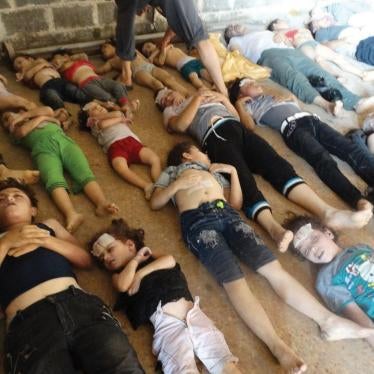(Beirut)– Bahraini authorities should immediately end the use of security forces to unlawfully attack peaceful protesters, Human Rights Watch said today. Riot police used teargas and sound bombs to disperse a demonstration on June 22, 2012, called by Al-Wefaq, Bahrain’s largest opposition group.
A small group of 25 or 30 people, some carrying flowers and led by Al-Wefaq’s leader, Sheikh Ali Salman, attempted to march to the protest site after the Ministry of Interior denied their request for a permit. They were stopped by a more or less equal number of riot police. Four witnesses told Human Rights Watch that riot police shot “flash-bang” grenades and teargas directly at the protesters without provocation. A video examined by Human Rights Watch appears to show police at first tossing flash-bang grenades into the crowd and then firing multiple rounds of the same type of device from riot control guns at extremely close range. The protesters behaved peacefully throughout and posed no threat of any kind to the officers or anyone else.
“Many months of so-called police reform and political reform appear to have done little to improve exercise of the right to peaceful assembly,” said Joe Stork, deputy Middle East director at Human Rights Watch. “Denying a permit request was bad enough, but the decision to attack obviously peaceful protesters with completely excessive force was much more serious.”
Ali al-Mowali, 27, was hospitalized with apparently serious head injuries. Witnesses told Human Rights Watch that a teargas canister hit al-Mowali when riot police attacked from a distance of just a few meters. He is being treated at the Salmaniya Medical Complex. At least three other people had lesser injuries including Salman, the Al-Wefaq leader, the witnesses reported.
Authorities arrested five protesters and charged them with illegal gathering, Jawad Fairooz, a leader of al-Wefaq, told Human Rights Watch. Al-Mowali is reportedly among those facing charges.
In a statement, the Interior Ministry said it will investigate the incident, but blamed the organizers for the casualties, saying, “They didn’t care about exposing the safety of the participants to danger.” The statement did not allege that the protesters were violent or threatening at any point.
“An official investigation into this incident is certainly warranted, leading to disciplinary action, and criminal prosecution of officers shown to have endangered lives with reckless use of crowd control devices,” Stork said.
“We were about 25 people, some of us were holding flowers to confirm that we are peaceful and we didn’t chant,” Fairooz told Human Rights Watch. “They gave us two minutes to disperse but they attacked before the deadline. The purpose of the riot police was not to disperse us but to suppress us.”
Hassan Marzooq, deputy secretary general of al-Wahdawi Association, a small opposition group, was hospitalized for injuries to his right leg from shotgun pellets, he told Human Rights Watch. “One sound bomb exploded on my shoulder and since then I have difficulty hearing in my right ear.” He was discharged from the hospital on June 24.
Fairooz said that authorities had previously allowed Al-Wefaq to demonstrate in the same area, but added: “during that week the ministry rejected four gathering requests from al-Wefaq. This seems to be a trend towards imposing more restrictions of freedom.”
Bahraini authorities meanwhile have continued to prevent Human Rights Watch and other international rights organizations from entering Bahrain and investigating human rights abuses there.
As a state party to the International Covenant on Civil and Political Rights, Bahrain must protect and promote freedom of expression and peaceful assembly. Bahrain also is obliged to abide by the United Nations Basic Principles on the Use of Force and Firearms, which require that lethal force only be used when strictly unavoidable to protect life, and then exercised with restraint and proportionality. The principles also require governments to “ensure that arbitrary or abusive use of force and firearms by law enforcement officials is punished as a criminal offense under their law.”






